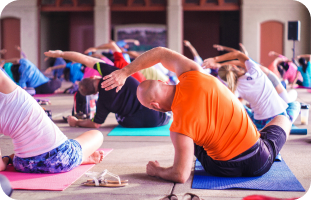Matthieu’s story with Myasthenia Gravis
Living with a chronic disease is never easy, and the journey becomes even more challenging when it takes years to receive a proper diagnosis. For Matthieu, who has spent 16 years navigating life with Myasthenia Gravis, coping meant adapting every aspect of his life and discovering strategies that work best for him. An extreme planner, Matthieu is balancing his social, family and professional life, turning obstacles into valuable lessons.
How can planning help adapt to life with Myasthenia Gravis?
For Matthieu, the key is planning. “Extreme planning”, he jokes. Taking into consideration all possible outcomes. According to him, all MG patients are extreme planners because otherwise, they would not be able to find a balance between life and illness. They need to adapt to the limitations. Matthieu adapted. He plans, deciding the best strategy to attend events, dinners, gatherings with friends and family. Sometimes, adapting means cancelling, even if some will not understand. He listens to his body and dedicates time for self-care and rest. Mental health is crucial for everyone, but especially for those battling a chronic disease.
How can caregivers support their loved ones?
Spontaneously, Matthieu says, “Educate! Learn about Myasthenia Gravis because the more you understand MG, the more you can support your loved ones.” For him, education is key, both for patients and caregivers. He emphasises the importance of working as a team. Learning about the condition is the first step toward greater awareness, allowing caregivers to provide meaningful support. Patience and kindness are essential, as the illness is unpredictable, with symptoms that can fluctuate daily.
Moreover, caregivers can also benefit from joining support groups alongside patients. These communities are not just for those living with MG. They offer valuable tips, resources, and a sense of belonging that can dispel isolation.
Practical support is equally important. Helping with daily tasks can make a huge difference. This rare neurological disease often demands mandatory rest, especially on challenging days, making parenting or managing household responsibilities difficult for patients. By stepping in, caregivers help lighten this burden and improve the patient’s quality of life.
Every story has something to teach us.
Subscribe now to hear more voices from the MG community
EU-UNB-25-00024 – Date of preparation: May 2025



